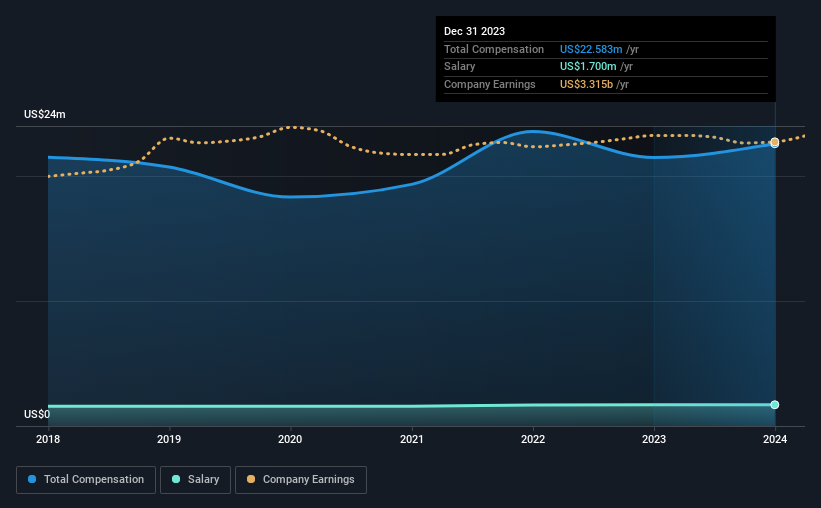Please use a PC Browser to access Register-Tadawul
We Think Shareholders Are Less Likely To Approve A Large Pay Rise For General Dynamics Corporation's (NYSE:GD) CEO For Now
General Dynamics Corporation GD | 0.00 |
Key Insights
- General Dynamics to hold its Annual General Meeting on 1st of May
- Salary of US$1.70m is part of CEO Phebe Novakovic's total remuneration
- The total compensation is 50% higher than the average for the industry
- Over the past three years, General Dynamics' EPS grew by 3.7% and over the past three years, the total shareholder return was 62%
Under the guidance of CEO Phebe Novakovic, General Dynamics Corporation (NYSE:GD) has performed reasonably well recently. In light of this performance, CEO compensation will probably not be the main focus for shareholders as they go into the AGM on 1st of May. However, some shareholders may still be hesitant of being overly generous with CEO compensation.
Check out our latest analysis for General Dynamics
How Does Total Compensation For Phebe Novakovic Compare With Other Companies In The Industry?
Our data indicates that General Dynamics Corporation has a market capitalization of US$80b, and total annual CEO compensation was reported as US$23m for the year to December 2023. That's a fairly small increase of 5.1% over the previous year. We think total compensation is more important but our data shows that the CEO salary is lower, at US$1.7m.
On comparing similar companies in the American Aerospace & Defense industry with market capitalizations above US$8.0b, we found that the median total CEO compensation was US$15m. Accordingly, our analysis reveals that General Dynamics Corporation pays Phebe Novakovic north of the industry median. Moreover, Phebe Novakovic also holds US$240m worth of General Dynamics stock directly under their own name, which reveals to us that they have a significant personal stake in the company.
| Component | 2023 | 2022 | Proportion (2023) |
| Salary | US$1.7m | US$1.7m | 8% |
| Other | US$21m | US$20m | 92% |
| Total Compensation | US$23m | US$21m | 100% |
Speaking on an industry level, nearly 22% of total compensation represents salary, while the remainder of 78% is other remuneration. General Dynamics pays a modest slice of remuneration through salary, as compared to the broader industry. It's important to note that a slant towards non-salary compensation suggests that total pay is tied to the company's performance.

A Look at General Dynamics Corporation's Growth Numbers
Over the past three years, General Dynamics Corporation has seen its earnings per share (EPS) grow by 3.7% per year. Its revenue is up 8.1% over the last year.
We're not particularly impressed by the revenue growth, but it is good to see modest EPS growth. It's clear the performance has been quite decent, but it it falls short of outstanding,based on this information. Historical performance can sometimes be a good indicator on what's coming up next but if you want to peer into the company's future you might be interested in this free visualization of analyst forecasts.
Has General Dynamics Corporation Been A Good Investment?
Most shareholders would probably be pleased with General Dynamics Corporation for providing a total return of 62% over three years. This strong performance might mean some shareholders don't mind if the CEO were to be paid more than is normal for a company of its size.
To Conclude...
The company's decent performance might have made most shareholders happy, possibly making CEO remuneration the least of the concerns to be discussed in the upcoming AGM. Still, not all shareholders might be in favor of a pay raise to the CEO, seeing that they are already being paid higher than the industry.
If you think CEO compensation levels are interesting you will probably really like this free visualization of insider trading at General Dynamics.
Arguably, business quality is much more important than CEO compensation levels. So check out this free list of interesting companies that have HIGH return on equity and low debt.
This article by Simply Wall St is general in nature. We provide commentary based on historical data and analyst forecasts only using an unbiased methodology and our articles are not intended to be financial advice. It does not constitute a recommendation to buy or sell any stock, and does not take account of your objectives, or your financial situation. We aim to bring you long-term focused analysis driven by fundamental data. Note that our analysis may not factor in the latest price-sensitive company announcements or qualitative material. Simply Wall St has no position in any stocks mentioned.



